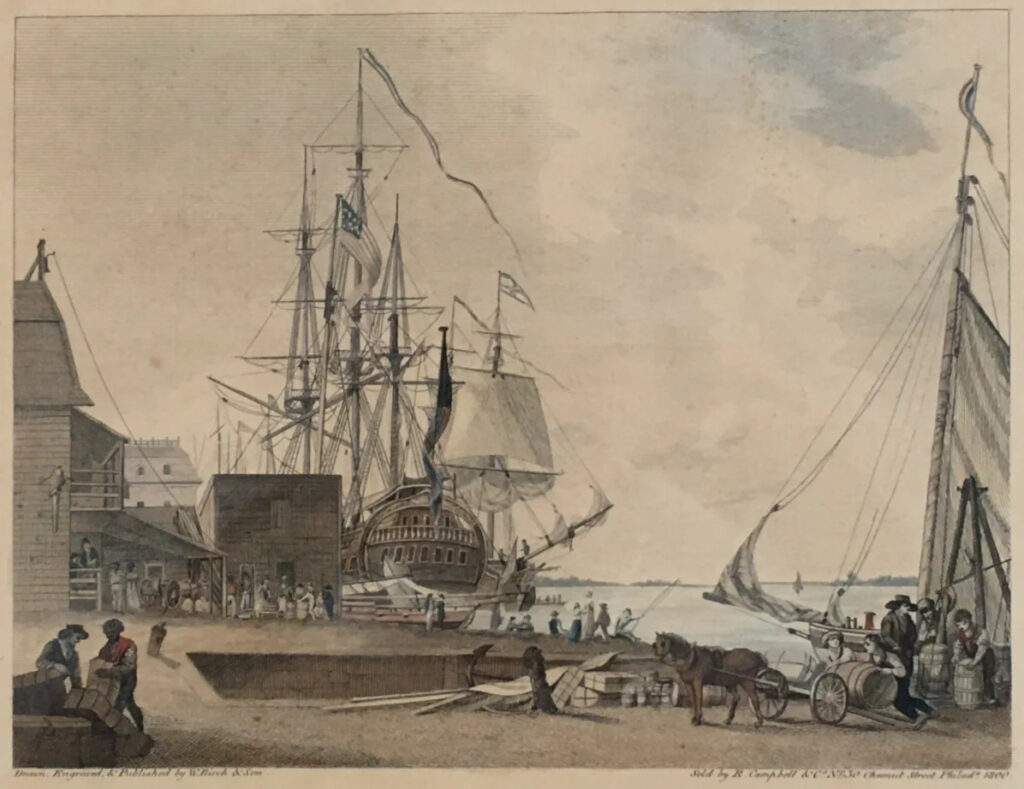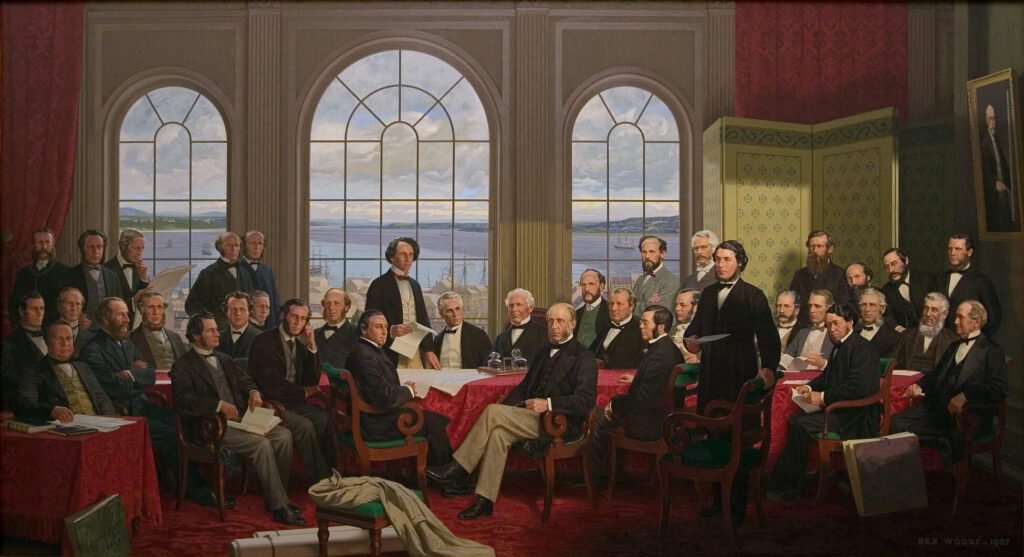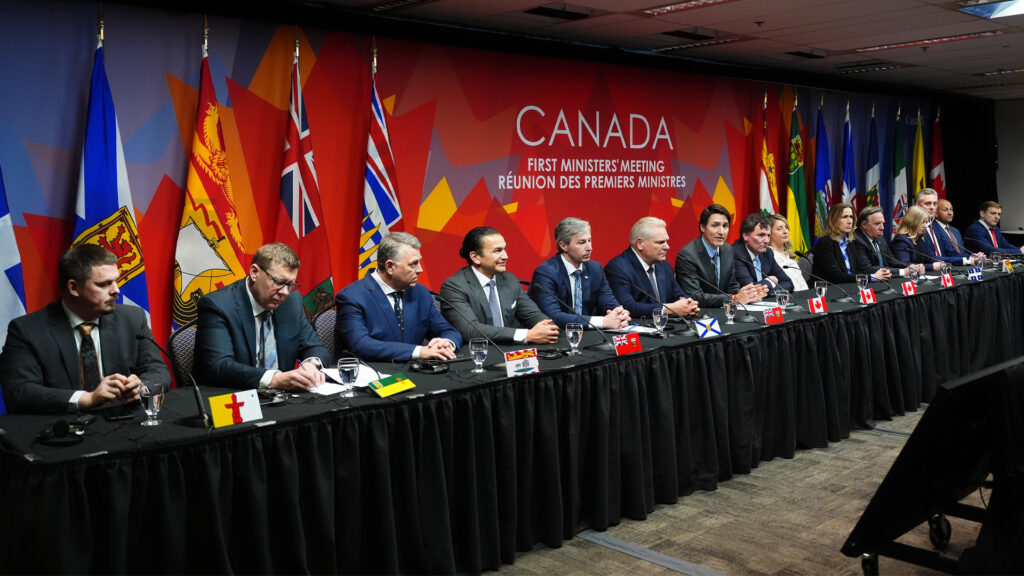Loyalist № 3
To the Peoples of North America, this being a Loyalist response to Federalist No. 11:
Well before he took office as the 47th President of the United States, Donald Trump made no secret of his intention to impose significant tariffs on America’s closest trading partners. The purpose of threatening tariffs against Canada was ostensibly to compel Us to strengthen security at the border, a demand that even Our self-professed “most pro-American Prime Minister” Stephen Harper (2006-15) found deeply nonsensical. Then-President-elect Trump was later more explicit about his motivations. “Economic force,” he suggested, was his preferred means of annexing Canada to the Union as the 51st state. Much as Clausewitz saw war as politics by other means, Trump tends to view trade as war by other means.
The tariff policy is doubly ironic. In the first place, it violates the USMCA trade deal (i.e. NAFTA 2.0) that Trump himself negotiated while serving as the 45th President. In the second place, it repudiates some of the foundational principles for securing the Union that animate the thinking behind many of the early Federalist Papers, particularly Nos. 3 to 13. Those papers were written only a few years after the 1783 Treaty of Paris ended the Revolutionary War. At that time, the early Republic still faced persistent external threats, including British troops along the northern border, Spanish control of the Mississippi, frequent raids by Indigenous groups along the frontier, and piracy in the Atlantic.
Alexander Hamilton believed that closer economic integration between the states was essential to defend against these threats. In Federalist No. 11, he argues that the great maritime powers of Europe – Britain, France, Spain, and the Netherlands – had adopted a common “policy of fostering divisions among us, and of depriving us, as far as possible, of an active commerce in our own bottoms,” by which he means trade carried out by American ships serving American interests. Hamilton feared that without a strong federal government to manage commerce and international relations, the states would remain vulnerable to foreign interference and economic exploitation.

The Articles of Confederation were fundamentally ill-equipped to achieve the economic integration of the states that Hamilton deemed essential for the preservation of America’s hard-fought liberty and independence. More of a decentralized alliance than a federation, America under the Articles did not have any central authority to regulate interstate or foreign commerce, leading to a patchwork of trade policies. Foreign powers could easily exploit these differences to sow discord and conflict among the states. Just as bad, the Articles made no provision for a navy or standing army, leaving American commerce vulnerable to attack, harassment, and piracy. But “under a vigorous national government,” Hamilton argues, “the natural strength and resources of the country, directed to a common interest, would baffle all the combinations of European jealousy to restrain our growth.”
Drawing on the diversity of resources that were to be found across the Thirteen Colonies would prove both economically and militarily beneficial. Hamilton observes,
The more southern States furnish in greater abundance certain kinds of naval stores – tar, pitch, and turpentine. Their wood for the construction of ships is also of a more solid and lasting texture. The difference in the duration of the ships of which the navy might be composed, if chiefly constructed of Southern wood, would be of signal importance, either in the view of naval strength or of national economy. Some of the Southern and of the Middle States yield a greater plenty of iron, and of better quality. Seamen must chiefly be drawn from the Northern hive.
Closer economic integration would allow these resources to be mobilized to serve mutual security interests while at the same time building strong domestic markets. Hamilton’s observations harken back to Federalist No. 2, written by John Jay, who argues that the lands of North America have been blessed not only with great natural wealth but also natural means, like great rivers, to distribute that wealth between the states. Pooling these vast resources would allow for the construction of a powerful navy to protect economic activity while also asserting the independence of the Union against former and would-be future colonial masters.
The Constitution that was ultimately agreed at Philadelphia of course granted the federal government exclusive powers over military and foreign affairs. It also embodied those powers, nominally under congressional oversight, in the President as Commander-in-Chief – more on that once We direct Our attention to Federalist Nos. 69 and 74.
Perhaps more importantly, the Constitution established several interrelated powers to ensure a strong economic union between the states. The Commerce Clause1 grants Congress the authority to regulate international and interstate trade. It has been further interpreted, via the so-called Dormant Commerce Clause, to forbid any state-level regulations from discriminating against other states or imposing undue burdens on interstate trade. Finally the Full Faith and Credit Clause2 ensures that legal instruments are recognized and enforced across state lines. Together, these powers effectively empower Congress – not the various states – to regulate commerce throughout the Union, thus facilitating the free flow of goods, services, and capital across the country.

Canada’s constitutional framework is far less robust in this regard. Despite establishing an otherwise strong federal government, the Constitution Act, 1867 prescribes an incomplete economic union of the provinces. While the General Trade and Commerce Power, codified in Section 91(2), grants the federal government jurisdiction over interprovincial and international trade, that authority is not as expansive as the U.S. Commerce Clause, leading to a proliferation of trade barriers – both intentional and accidental – between the provinces. For example, consumers are unable to purchase and transport alcohol across provincial boundaries, and unpasteurized Québec cheese cannot be sold outside that province.
Section 121 ostensibly allows the free flow of trade between the provinces:
All Articles of the Growth, Produce, or Manufacture of any one of the Provinces of Canada shall, from and after the Union, be admitted free into each of the other Provinces of Canada.
Yet this promise falls short of the U.S. Dormant Commerce Clause. Quite to the contrary, in 2018 the Supreme Court of Canada significantly narrowed – some even say “effectively nullified” – the scope of this part of the Constitution in R. v. Comeau; the court said unanimously that the section extends only to prohibiting provinces from imposing tariffs and import taxes. According to the decision, Section 121 does not prevent provinces from regulating the sale and distribution of goods within their own borders per the Property and Civil Rights Power under Section 92(13) – even if those regulations “incidentally” impose additional costs on businesses or consumers elsewhere in the federation.
While the Trade and Commerce Power in principle allows the federal government to pass laws regulating economic activity, provinces nevertheless retain significant authority over commerce within their own borders, often resulting in provincial regulations that can hinder the free flow of goods, services, and capital across the country. Unlike Jay’s view in Federalist No. 2 of America’s great rivers serving as providential “highways for the easy communication of friendly aids, and the mutual transportation and exchange of various commodities,” truckers transporting goods beyond the Manitoba–Ontario–Québec corridor absurdly need to swap out one set of tires for another at provincial borders because of conflicting regulations.
Finally, Canada has no exact equivalent to the robust and comprehensive U.S. Full Faith and Credit Clause. Instead, We have a patchwork of doctrines, legal precedents, and national and provincial legislation to achieve something that barely approximates it. While contracts, for example, are recognized across Canadian jurisdictions, professional accreditation and licences are not. This means that labour cannot flow freely across provincial boundaries unless interprovincial agreements are in place to facilitate that purpose. In many ways the Charter’s promise of a right to pursue a livelihood in any province rings hollow.

Much as Hamilton argues in Federalist No. 11, there are serious national security implications to Our patchwork of economic regulations. In the face of the Trump tariff policy, Canada’s First Ministers assembled a week before Inauguration Day in an effort to present a united front against that common threat. The joint statement that was issued following the meeting connected the U.S.–Canada trade relationship to a variety of national security issues, such as stopping the illegal flow of drugs, guns, and migrants across the border as well as meeting NATO’s 2% national defence spending target. Our Government in Alberta under Danielle Smith, however, stood as the lone dissenter and refused to sign on to the statement, citing a desire to protect that province’s own energy sector from retaliatory tariffs – even at the expense of national solidarity.
Just as Hamilton feared that an incomplete economic union of the states would invite a “policy of fostering divisions among us,” so have We Ourselves fallen prey to the same strategy employed by the new U.S. administration. In the context of American economic aggression and overt threats to annex Our country to theirs, Canada’s incomplete economic union raises the spectre of Hamilton’s warning to his own compatriots urging their ratification of the U.S. Constitution and the strong national government it prescribed: “In a state of disunion … It would be in the power of the maritime nations, availing themselves of our universal impotence, to prescribe the conditions of our political existence.”
In the same spirit in which Hamilton draws Federalist No. 11 to a close, so too do We implore: Let Us disdain to be the instruments of American greatness! Let the Thirteen Provinces and Territories join together in one great economic Union! ♛
Cover image credit: “Serving the Nation,” painted by Dean Cornwell in 1943.
Footnotes
- Article I, Section 8, Clause 3: “To regulate Commerce with foreign Nations, and among the several States, and with the Indian Tribes.”
- Article IV, Section 1: “Full Faith and Credit shall be given in each State to the public Acts, Records, and judicial Proceedings of every other State. And the Congress may by general Laws prescribe the Manner in which such Acts, Records and Proceedings shall be proved, and the Effect thereof.”




What bothers me is that, in order to bring down provincial trade barriers, our First Ministers will propose some shallow set of MOUs or revocable political arrangements that will be uninspired, weak, and… wet. They will be loathe to take on the great task of Constitutional repair. We should demand the political determination to fix by constitutional amendment the damage done by the courts to the constitution’s free trade provisions.
Agreed. The trouble with Canadian politics so often seems to be that everyone holds on to their constitutional issues to use later as a bargaining chip with the other governments. But really – if it’s to be a living tree – the Constitution should be amended as soon as the need for change has become clear. It can’t be all or nothing.
We passed a targeted amendment before. In 1940, for example, We all agreed to (re)empower the federal government to manage a national Employment Insurance scheme, which had been struck down by Our friends at the Judicial Committee of the Privy Council. Everyone recognized that EI had a national collective benefit that could not be achieved – never mind paid for – through a patchwork of provincial programs. (Granted, the process was a bit easier then, without the current amending formula.)
Perhaps in this moment of national crisis, We’ll all realize how pressing it really is finally to fix the problem of internal trade. The ongoing existence of Our country is at stake. We need this change now. There may well be a growing public recognition that this is an amendment that can’t wait for a full constitutional convention.
—Gloriana.